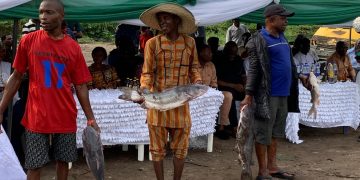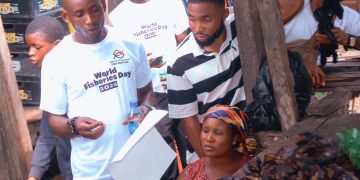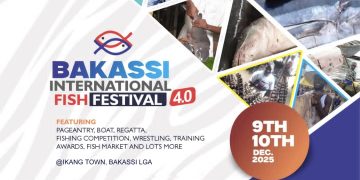For generations, the people of Bakassi have lived in harmony with the waters surrounding their breezy banks. The sea is their lifeblood, their source of sustenance, and their heritage. On this World Tourism Day, the Bakassi International Fish Festival symbolizes not just a celebration of these traditions but a gateway to a prosperous future driven by ecotourism and the blue economy.
In Bakassi, fishing isn’t just a profession; it’s a way of life passed down through generations. Picture a typical fisherman—let’s call him Ita. Each morning, Ita wakes up before dawn, gathering his nets with expert hands and setting sail into the open sea in his wooden canoe. His knowledge of the waters runs deep. His ancestors fished here, navigating the tides and understanding the subtle rhythms of the ocean. But life has changed for Ita and his fellow fishermen. With increasing environmental challenges and limited market opportunities, they have struggled to maintain their traditional livelihoods.
The Bakassi International Fish Festival isn’t just a gathering; it’s a movement, a lifeline for people like Ita. It’s a space where local fishermen, seafood traders, artisans, and community members come together to celebrate their rich heritage while exploring new avenues for economic empowerment. For Ita and countless others, the festival has become a beacon of hope. Through workshops on sustainable fishing practices, marine conservation, and tourism opportunities, Ita’s way of life is no longer at risk. Instead, it’s evolving, adapting to modern times without losing its essence. The festival has opened doors, creating platforms for local fishermen to connect with international buyers, tourists, and investors, giving them access to bigger markets beyond their wildest dreams.
The blue economy is a term that’s becoming more familiar in the modern development world and around maritime communities, but what does it mean for someone like Ita or a local seafood seller like Mama Nkoyo, who’s been selling fish in the market for decades? The blue economy refers to the sustainable use of ocean resources to promote economic growth, improve livelihoods, and ensure the health of marine ecosystems. At the heart of the Bakassi International Fish Festival is this very concept. The festival doesn’t just provide entertainment; it’s an opportunity to introduce the local community to the potential that lies in sustainable ocean-based economies. For people like Mama Nkoyo, who dreams of expanding her business, the blue economy offers pathways she never thought possible—clean energy projects, sustainable fisheries, eco-friendly aquaculture, and even marine tourism.
The festival itself is a vibrant showcase of these opportunities. Stalls line the festival grounds, with visitors sampling freshly caught seafood, buying hand-woven fishing nets, or admiring intricately carved wooden canoes. Each transaction represents a shift, a new awareness that the ocean is not just a resource to be exploited but a treasure to be protected and managed responsibly. Through the festival, Bakassi is steadily positioning itself as a marine tourism hub, attracting visitors eager to experience the raw beauty of the region’s waters, its thriving biodiversity, and its pristine mangrove forests. It’s a delicate balance, one that the blue economy seeks to maintain—boosting local revenue while preserving the environment for future generations.
One of the most exciting developments tied to the festival is the proposed Bakassi Deep Seaport. For a fisherman like Ita, this seaport isn’t just another infrastructure project—it’s a symbol of progress. The deep seaport will transform Bakassi from a relatively secluded fishing community into an international gateway for marine trade and tourism. Imagine this: Ita, whose catch was once limited to local markets, can now send his fish to international markets as better logistics and transportation systems will be put in place. Mama Nkoyo can now supply her dried fish and seafood to buyers from as far away as Europe and Asia. The seaport will not only boost accessibility for international tourists but also improve the region’s standing in global seafood trade.
For the Bakassi International Fish Festival, the deep seaport means greater potential for growth. With improved access to international markets and investors, the festival will attract an even larger audience, elevating Bakassi’s status as a top destination for both cultural tourism and marine trade. Beyond the festival grounds, its influence is being felt across the entire Bakassi region. The festival has become a powerful platform for educating the community on sustainable practices. Through collaborations with NGOs and governmental bodies, the festival promotes peace and development, positive storytelling, mangrove conservation, encourages sustainable fishing techniques, and raises awareness about the critical need to protect Bakassi’s marine ecosystems.
For many in Bakassi, the mangroves are more than just trees. They provide shelter, serve as breeding grounds for fish, and act as natural buffers against coastal erosion. The festival’s focus on protecting these precious ecosystems ensures that future generations will continue to thrive in harmony with nature. Moreover, the festival has ignited community pride. As international visitors flock to Bakassi to experience its rich culture and natural beauty, local residents have begun to take pride in their unique heritage. This surge of pride is evident in the colorful dances, vibrant costumes, and rich storytelling that define the festival, each performance a reminder of the deep connection between the people and the sea.
As we look back on last year’s festival, which also coincided with World Tourism Day, we recall the many successes and challenges recorded. The festival brought a sense of unity, pride, and economic growth to the community, but it also highlighted areas where improvements could be made—logistical challenges, environmental management, and scaling the reach of the event. This year, the focus is on not only maintaining but also surpassing the milestones already achieved. The community is eager to drive even more success, facing every challenge with determination, resilience, and optimism.
For all its successes, the Bakassi International Fish Festival and its alignment with the blue economy can only reach their full potential with continued support from the government and stakeholders. Infrastructure development, enhanced security, and targeted marketing campaigns are crucial to ensuring Bakassi’s ecotourism and marine economy continue to grow. Equally important are government policies that prioritize sustainable practices and community involvement. For someone like Ita, whose livelihood is tied to the health of the sea, the festival and the blue economy are more than concepts—they’re a new way forward. As he casts his nets into the ocean each day, Ita knows that the future of Bakassi is brighter, not just for him but for generations to come.
On this World Tourism Day, we celebrate the power of ecotourism and the blue economy to transform lives. Bakassi is not just a community rich in culture and tradition; it’s a beacon of hope for sustainable development. Kudos to the Bakassi International Fish Festival team for leading the way, ensuring that the people of Bakassi, like Ita and Mama Nkoyo, are not left behind in the tide of change. The future of Bakassi’s ecotourism, blue economy, and marine heritage is bright, and the journey has only just begun.
























